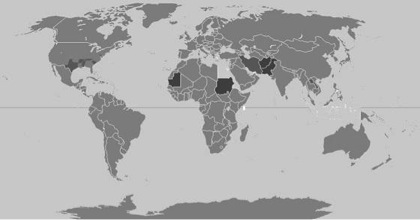
“The Freethought Report 2013,” commissioned by the International Humanist and Ethical Union (IHEU) to study the condition of human rights and protection for atheists in all 192 countries has found that a global majority of nations do not protect the rights of atheists, agnostics, skeptics and freethinkers, including 13 countries where it is punishable by death in law. Many of these countries are signatories to the U.N. Declaration of Human Rights and other global treaties guaranteeing the freedom and equality of citizens. The report was released on December 10th, which is the U.N. Human Rights Day. The study document was presented to the U.N. Human Rights Council the day before.
To be an atheist or religious skeptic, or to change your religion is to face the death penalty in Pakistan, Maldives, Afghanistan, Mauritania, Iran, Nigeria, Qatar, Saudi Arabia, Somalia, Sudan, Yemen and the United Arab Emirates – all having Islam as their official state religion (In Nigeria, the Muslim-dominated autonomous states of the north have implemented Sharia law).
However, official and unofficial discrimination against atheists is prevalent even in democratic nations across Asia, Africa and the West. According to the report, "there are laws that deny atheists' right to exist, revoke their citizenship, restrict their right to marry, obstruct their access to public education, prevent them working for the state...."
The president of the IHEU, Sonja Eggerickx stated: "This report shows that the overwhelming majority of countries fail to respect the rights of atheists and freethinkers although they have signed U.N agreements to treat all citizens equally.”
Discrimination Prevalent in Europe and the American Continents
The IHEU's report severely criticizes the continuing prevalence of “blasphemy” laws that carry jail terms of up to 3 years for “offending a religion or believers.” It identified such laws and resulting serious discrimination in Austria, Denmark, Germany, Greece, Hungary, Malta and Poland. With the exception of the Netherlands and Belgium, who were identified as “free and equal,” all EU member nations were faulted for favoring the religious and allowing widespread discrimination against non-believers.
While the United States was identified as “mostly satisfactory” due to the presence of legal protection for the rights of non-believers, the report criticized the presence of statutes “that equate being religious with being American.” The “mostly satisfactory” tag was shared by Brazil. However, only Jamaica and Uruguay – whose president, Jose Mujica is a known atheist – achieved the “free and equal” status. The IHEU identified the situation as grim for atheists in most other Latin American and Caribbean nations, where extensive discrimination was reported.
Not Much Better in Asia and Africa
For India, the report criticized the lethargic response and unwillingness of police forces to investigate the murders of atheists and skeptics of religions and superstition. The murder of rationalist activist Narendra Dabholkar, who led a campaign against superstition and black magic, sparked outrage that finally prompted some state governments to pass laws outlawing black magic and superstitious activities. Although Indian police only recently reported some arrests, progress on the case remains slow. India has also witnessed multiple cases of writers and artists being harassed and arrested by police on complaints made by religious parties using archaic laws prohibiting “hurting religious sentiments.” Most recently, a police complaint was filed against secular humanist author and poet Taslima Nasreen by a Muslim cleric for her tweets criticizing an Indian politician for meeting with an Islamist cleric who had offered a monetary reward for her killing.
Extreme violations of human rights of atheists were reported in countries facing political upheaval and conflict, such as Egypt, Libya, Morocco, Zimbabwe and Eritrea.
Further Repression Coming Up?
Earlier in December, a leading official of the Organisation of Islamic Cooperation (OIC) said the body would work to achieve the criminalization of criticism of religion in talks with various Western nations. The chief of the 21-nation Arab League had proclaimed before the U.N. Security Council in November, 2012 that the League wanted a binding global agreement to guarantee “that religious faith and its symbols are respected.” The IHEU report comes amidst fresh efforts by Muslim countries to ban criticism of Islam, identifying it as “Islamophobia.”
The IHEU has identified that many Muslim states had increased their repression of individuals who expressed doubts or skepticism of religion, regardless of them identifying as atheist. Nations such as Bangladesh, Bahrain, Egypt, Indonesia, Kuwait, Saudi Arabia, Tunisia and Turkey were criticized for increased prosecutions and harassment of individuals in supposed cases of “blasphemy” and religious criticism in social media.
